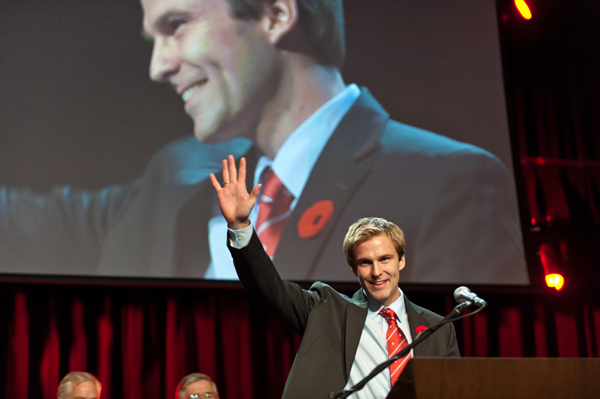Brian Gallant, LLM’11, is the only premier in Canada who might have to worry about getting carded in a bar. The youthful-looking 32-year-old is the new head of the government of New Brunswick and the youngest premier in Canada. If he’s not careful, though, he might age in a hurry.

By Daniel McCabe
Gallant could soon face tough debates on fracking (he plans to institute a moratorium on hydraulic fracturing) and on access to abortion (which he has promised to improve). The biggest challenge, though, will be to kick-start his province’s moribund economy. Gallant led his Liberal Party to an election victory in September, based, in large part, on his promise to focus on improving the province’s bottom line.
“We’re facing many challenges,” acknowledges Gallant. “We’ve had one of the worst unemployment rates in Canada over the last four years. We’ve had stagnant GDP growth. I realize there’s no magic pill for that. It’s going to take hard work, patience and a diversified approach. We’re going to have to get the big things right and a lot of the little things right too.” One of his government’s first moves will be to follow up on a campaign promise to devote $900 million in spending on the province’s infrastructure, with the hope that it will spur job creation.
A former provincial tennis champion (he and his brother Pierre have earned multiple doubles titles, as recently as last year), Gallant says his first brush with political office happened when he was made vice-president of his fifth grade class. “I was the new kid in the school and nobody else wanted the job.”
He must have enjoyed the gig. He went on to become the president of his elementary and high schools and the head of the student federation at Université de Moncton, where he did degrees in business administration and law.
After completing his law studies at Moncton, Gallant says he felt a certain restlessness. “I wanted to spend more time thinking about the law and how it related to justice and social policy issues in a way that I don’t think I would have been able to do in a corporate practice,” Gallant says. “I was also interested in going outside the province for a while, to gain a little perspective. I decided to do a master’s while I was still relatively young.”
Gallant opted for McGill. “Obviously, the dynamic of being in Montreal was part of the attraction,” he says. But Gallant had a few reservations.
“I did have a nagging doubt,” says Gallant. “Part of me thought that maybe I should have gone outside the country. Once I got [to McGill], I ended up having the international experience I was looking for. Most of the students in my class were international students. I met people from around the world. I learned about different cultures.”
Associate professor of law Richard Janda, BCL’85, LLB’85, was one of Gallant’s teachers at McGill and frequently bumped into the future premier at the gym. “It was obvious that he was quite comfortable with public speaking,” says Janda, remembering a fairly tough oral presentation that the students in his course on Theoretical Approaches to Law had to make. “After Brian’s presentation, a number of people said, ‘Here’s someone who clearly has experience with making speeches.’
“He was quite focused and forthright about the goals he was after,” Janda says. “Even then, he was thinking about his future in the Liberal Party. He was obviously very ambitious, but I was also struck by his humility.” While many future politicians emerge from law schools, Janda says he has noticed “a decline of political ambition” among students in recent years.
“People are somewhat more cynical about what it means to be involved in politics. There is a certain sense of optimism when you meet someone like Brian who is politically ambitious, but who also seems to be guided by a real interest in public service.”
Gallant too has noticed that many Canadians are disillusioned with politics. He has been trying to do something about it. When he was the leader of the opposition in New Brunswick, he emphasized civility and bipartisanship. He instructed his caucus that heckling and other forms of disruptive behaviour in the legislature wouldn’t be tolerated. Now that he is premier, he wants to maintain the same respectful tone.
“I’ve told my caucus that it’s the kind of thing that’s hard to build up and easy to lose,” Gallant says. “I see a real opportunity to change the culture of this legislature. The people of New Brunswick will see a very disciplined, sober and responsible group focusing on job creation to the best of our abilities.”
While the task of being premier is daunting enough, Gallant also named himself the minister responsible for women’s equality. Only eight of the 49 MLAs elected in the last New Brunswick election were women. Four of those women are members of his government. “We didn’t elect enough women,” says Gallant. “Clearly, there are still systemic barriers that we need to be thinking about. Putting [the ministry for women’s equality] in the Premier’s Office sends out a message about the importance of the issue.”
Gallant says McGill played an important role in his life and he isn’t shy about broadcasting the fact. He owns two McGill ties and claims that one of them is his “lucky tie.” He has worn it on important occasions – at the leadership convention when he became the head of the Liberals, on election night and at the swearing-in ceremony for the newly elected members of the New Brunswick legislature. “I noticed that Mike Babcock [BEd’86, LLD’13] wears a McGill tie for some of his most important games,” Gallant says of the hockey coach who has led teams to two Olympic gold medals and a Stanley Cup. “It seems to work for him.”
[This story originally appeared on the McGill News website]
[ JUMP TO THE CURRENT EDITION OF FOCUS ONLINE ]
